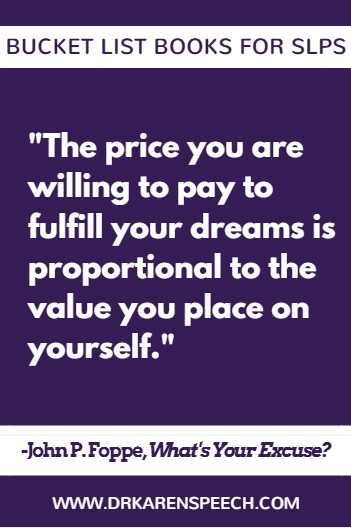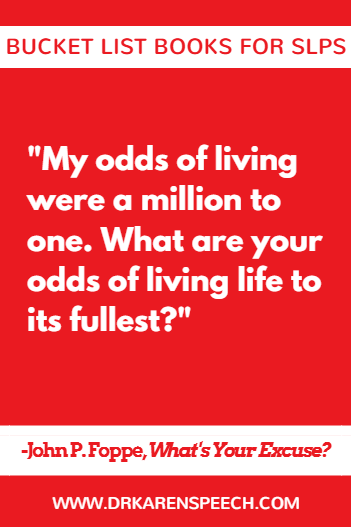What would you do if you had no arms?
When John Foppe’s parents rushed to the hospital on the day of his birth, they were expecting to deliver a healthy baby girl.
Imagine their shock when instead, they delivered a baby boy with no arms, and an abdominal issue that almost cost him his life; all due to a rare congenital condition.
Even though John’s odds of surviving the surgery to repair his abdomen were a million to one, death was not in the cards for John that day.
And while he started his life unable to feed or dress himself or play sports like other kids his age; he would go on to achieve more in his 20s and 30s than many people do in a lifetime.
In his book, What’s Your Excuse?: Making the Most of What You Have, John recounts these experiences, starting with the challenges of his childhood.
“I hate you! You are the worst mother in the world!”
These are the first words of the first chapter on page 1. The book starts off with John recalling an event from his childhood. He wanted his mother to help him put his pants on. After all, he had no way to pull them up (or so he thought). But she reluctantly (and painfully) refused.
The scene unfolds, as John screams at his mother, while she sits silently on the edge of his bed crying; willing herself not to give in to his pleas for help.
By today’s standards, some people would consider this type of behavior as neglect. In the age of immediate gratification and entitlement, we hesitate to take away our children’s tablets and phones. We worry about making them wait more than just a couple minutes for anything.
Many of us wouldn’t think twice about dropping everything to help our children immediately when they ask for it. Especially if it’s a child with a disability.
Yet as the story of John’s life progresses through the rest of the book, we see his mother’s tough love pay off.
“Handicapped”, “Disabled”, or “Physically Challenged”: What are we supposed to call it?
In the second chapter of the book, John goes on to talk about terminology such as “handicapped”, “crippled”, “disabled”, or “physically challenged”; and shares his perspective as a person who has been labeled with all of these terms.
Most of us working in clinical or educational settings have been trained to use “person-first” language. For example we would call John a “person with a disability” instead of a “disabled person”.
And while John explains that he’s not overly preoccupied with labels, he prefers the word “condition” because he feels it best explains the idea that a “disability” is just one part of what makes a person who they are.
He goes on to talk about how we all have our own unique “conditions” we’re dealing with; whether society deems them official “disabilities” or not. From anxiety, to workaholism, to becoming a victim of our own excuses, we all have something.
He follows by talking about the choices we make each day and how they impact how we handle the hand we’ve been dealt in life.
“The first thing you need to do is often the last thing you want to do.” (John Foppe, p.24)
In the next few chapters, John shares how important it is that we not only give tough love to others, but also that we give it to ourselves. This is probably my favorite part of the book because it’s the ultimate turning point.
Here, we revisit the events leading up to the initial bedroom scene in the first chapter.
It reminds me of a saying that I’ve often seen on different motivational memes and posters, something to the effect of: “You have to be willing to sacrifice what you want RIGHT NOW for what you really want.”
For John, this truth came to light in his family when his parents did an intervention with his four older brothers, who never hesitated to help their younger brother with anything he needed.
That is, until their mother threatened to discipline them if they continued to shell out help at every opportunity. His mom’s exact words were: “If John has to walk around naked until he learns to dress himself, then we’ll have to let him go naked.” (p. 41).
In the middle chapters, John reflects on how he dealt with day-to-day tasks we all take for granted; or maybe even complain about doing. Writing, brushing our teeth, dressing ourselves. Even driving to work.
John also tells the story of how sharing his personal journey through these daily living tasks landed him a chance to give a motivational speech to the Miami Dolphins.
During the rest of this inspiring memoir/self-help guide, John shares insights we can all apply to our lives, including things like:
- How to make tough choices, and why usually the thing we need to do is the last thing we want to do.
- How to stay objective about our own behaviors, and why it’s so important to constantly reflect on the way we respond to our experiences.
- How to ask the right questions, so we can come up with creative solutions to our problems.
- How to stop self-loathing and self-pity, and take responsibility for our position in life.
- How to ask for help, and why doing so is not a sign of weakness (including why getting “professional help” doesn’t have to have a negative connotation).
- How to make the most of everything you have, even if your situation is not ideal.
My favorite part of this story (in addition to the bedroom dressing scene) ties back to the original sacrifice John’s parents made when they gave up their dream home because of John’s physical condition.
When John was very young, John’s parents had planned to purchase a beautiful three-story Victorian home. However, they backed out at the last minute because they didn’t think John would be able to get up and down the stairs.
Yet when John was 24, he did something that shocked and inspired his parents. And it had to do with that dream home they gave up for his sake.
I won’t give any spoilers here, but I will say this:
- The things we give up for the right reasons have a way of coming back to us in some way, shape, or form.
- You should read the book and find out what happened.
- You may need to have Kleenex on hand when you read chapter fourteen.

John barely lived through his first day.
Yet he’s gone on to deliver a motivational speech to a professional football team, to be summoned for a papal blessing by the Pope, to be named one of the “Ten Outstanding Young Americans” by the US Junior Chamber of Commerce, to travel the world, and to run a successful non-profit organization, among many other outstanding accomplishments.
So before I wrap up this review, I just have some questions for you.
Is there some area of your life that you’ve been neglecting?
Do you have something you’ve been talking about doing for ages, but for some reason you haven’t taken action?
If so, what’s your excuse?
Leave a comment and let me know.
Did you enjoy this article? Do you want to read more just like it? If so, join my mailing list by clicking the pink button below.


